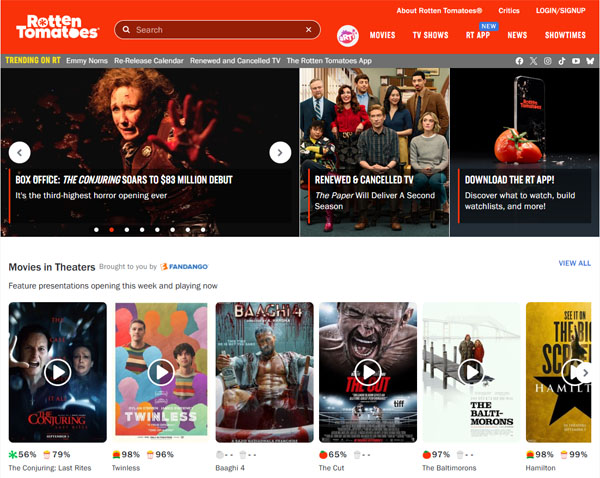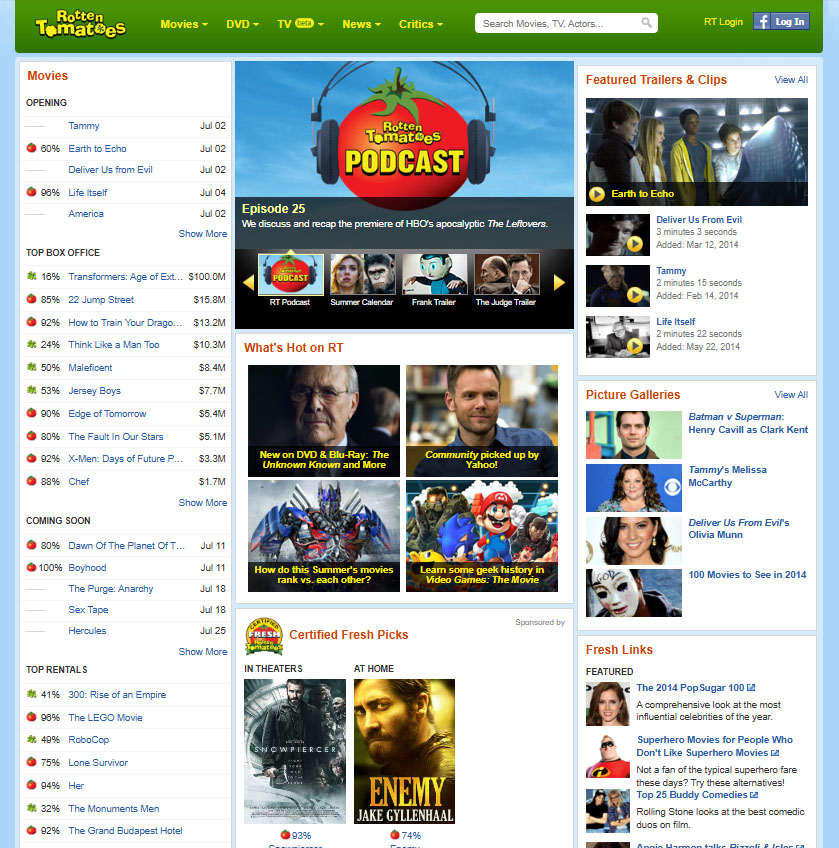 Rotten Tomatoes website on 9-8-25
Rotten Tomatoes website on 9-8-25
Do you think that movies today are better than they were 10 years ago? On average, or maybe by exactly 13%? Cause Puck News just pointed out that reviews on Rotten Tomatoes have trended upward between 2014 and 2024, resulting in RT scores that are about 13 points higher than a decade ago. In covering Puck’s article, Dustin Rowles at Pajiba noted that there were 140 RT critics when he joined their ranks in the 2000s, whereas today there are a whopping 3,500. So are critics/people genuinely feeling more positive today than they were in 2014? Har-Har; I laugh because I dare not cry. No, it’s that much like our national press and the current (mal)administration, film critics and studios are in an unhealthy codependent relationship wherein critics have to offer up favorable reviews in order to keep getting early access to new films to review in the first place. Dustin further breaks it down for us:
As someone writing reviews in both 2014 and 2024, let me tell you: Movies have not gotten nearly 15 percent better overall. I’ll grant that they’re less bad, because the algorithm has a floor, but they’re also less good, because the algorithm has a ceiling. So why would the average RT score rise 13 points in a decade?
I’m glad there’s data to back this up, because I‘ve definitely noticed. And not just in the very early reviews, where studios give access only to critics they know will love their movies — since if they don’t, they won’t get invited to the early screenings — and then quickly publicize the RT score before the rest of the crowd brings it back down to earth. But it’s also in the overall scores, after everyone has weighed in.
…A lot of it is still about access. There are now 3,500 accredited RT critics, and they want to be invited to screenings. … But as Belloni notes, the studios really have rigged the Rotten Tomatoes game. There may be 3,500 critics, but a blockbuster still only gets around 300 reviews, while a smaller film may only get 10 to 50. That makes it easier for studios to game the system. As of 2018 (and the disparity is almost certainly bigger now), there were six publicists for every journalist. And it’s their job to get favorable coverage, and they have the resources and manpower to procure it.
And that’s why movies are “13 percent” better in 2024 than a decade ago. Not because they’re actually better, but because there are more critics and, overall, they’re a lot nicer (and in many cases, incentivized to be nicer). In other words, take Rotten Tomatoes with a grain of salt. Or find a critic you align with, or even disagree with. (One of my favorites is someone I usually disagree with, which is to say: If she doesn’t like it, there’s a good chance I do.) The RT grading system is already specious (if a critic likes something slightly more than they dislike it, it still counts as 100 percent), so maybe don’t put all your faith in those silly percentages. Was the John Wick spin-off Ballerina really worthy of a 76 percent RT score? Or was it closer to 63?
Six publicists to every journalist?! I mean, I totally believe it. It’s not surprising, but it still is shocking. On the flipside of this equation, think of how undeniably rotten Madame Web had to be to beat a rigged system! (Its RT score was 18% upon release, though that’s now dropped down to 10%.) Anyway, I agree with Dustin’s advice: find a critic whose work speaks to you and stick with that. Or a critic whose writing you really enjoy, even if you don’t always have the same tastes or takes on movies. One of the reasons I always read a review written by Sarah at LaineyGossip is that she never fails to make me laugh somewhere in her write up. And these days, I consider being able to make someone laugh as one of the greatest gifts one human can bestow upon another.
Incidentally, last night my mother was flipping through her DVR listings and excitedly noted that the 1940 Cary Grant-Katharine Hepburn classic The Philadelphia Story had “100% from Rotten Tomatoes!”
Rotten Tomatoes website on July 1, 2014 via Wayback Machine












Honestly, reviews matter very little to me anymore. If there is a movie that I’m not familiar with and I’m hearing from both critics AND people I know IRL that its amazing, I might go see it or add it to the streaming list. but i don’t take things like RT or critics’ reviews seriously anymore, and the access portion of it is a big aspect of that. the critics want to keep getting invited to the early showings so they’re going to play the game.
You see the same things with books – people who get ARCs are often pretty gentle on a book and tend to give more favorable reviews because they want to keep getting ARCs. And if there is a negative review its usually pretty apologetic. And with booktok or bookstagram, reviewers will hype up a book that’s starting to get buzz so they can feel like they’re part of a trend or whatever. Or they get an advance copy again and they want to keep getting those. Its how some really bad books get huge buzz even if they’re actually not good (looking at you Lightlark trilogy.) I can’t find the equivalent for movies but for books I’ve found a few accounts that are more honest and open and are willing to say “nah, this popular book wasn’t actually that good.” Not that they trash the authors or every book, but they’re just not booktok sycophants.
/end rant
Thank you for this summary. I do read reviews, but don’t take them seriously anymore either, especially as I have learnt to be cynical about them due the the access game and subsequent over-hyping. But I had no idea how far it went, so now I’ll know what else to look out for!
Agree with above. There’s really no one to follow. I used to love Entertainment Weekly and some specific reviewers they had, also Television Without Pity was very good and their synopsis was great but now I don’t follow anyone. If I did it may end up being AI.